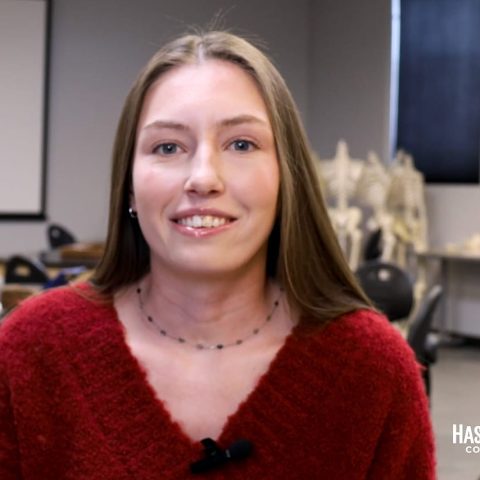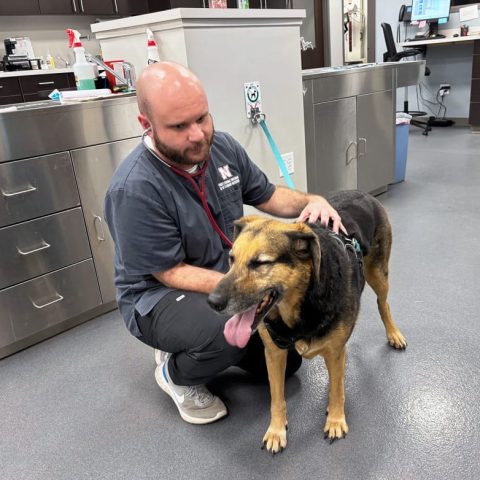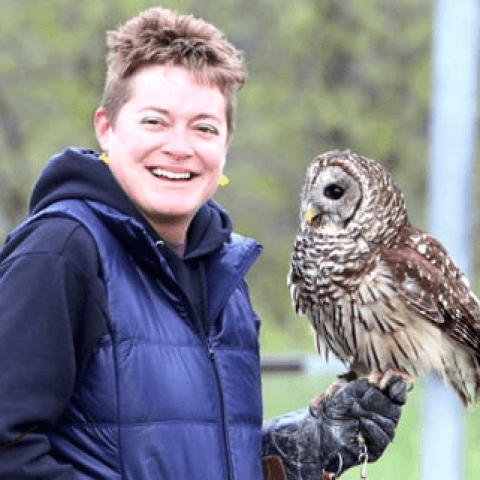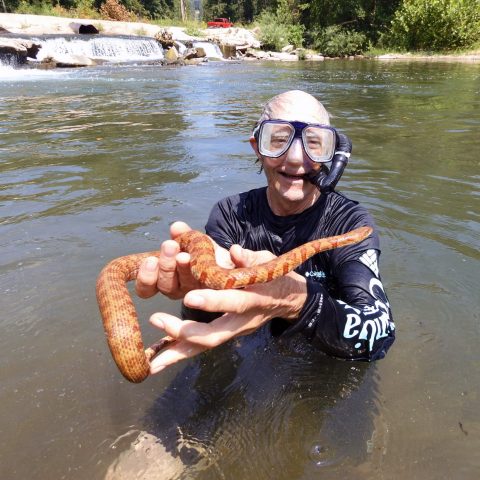Wildlife Biology
With a Wildlife Biology degree from Hastings College, students find careers as wetland scientists, conservation directors, animal care specialists at zoos, endangered species biologists or park rangers. This major covers a broad range of study — while still being able to hone in on your specific area of interest.
Do challenging, valuable work
Through a sequence of courses, you’ll build upon the basic biology major by examining diverse organisms and biological phenomena. This will equip you for a career in wildlife management at a state or national park, in research at a laboratory or in resource management on a farm. You’ll have knowledge of the details and of the broader picture of wildlife in society.
Create your future
See for yourself how we tailor your education to your talents and your goals. Schedule a visit and we’ll demonstrate how Hastings will inspire you to reach your potential, or if you’re a high school senior, apply today.
Go further with a Hastings education
Thanks to our small class sizes (most have fewer than 20 students!), and a student-to-faculty ratio of 13:1, you’ll work closely with faculty and your advisor to complete your degree in four years. In fact, most students who graduate from Hastings do so in four years!
Our block-style semester structure means you’ll take just one or two classes at a time — which really lets you focus more intently on each class. It also lets faculty devote more time to every student because they’re only teaching one or two classes in a block!
Graduate with experience
At Hastings College, Wildlife Biology majors get internship opportunities at local and regional wildlife centers that open doors and help you build a supportive network likely to produce your first job or result in the perfect recommendation for graduate school. Many take advantage of additional experiences and insight that help advance career options. Every biology major completes a research presentation to demonstrate what you have discovered. What does all this mean? You’ll graduate from Hastings ready to succeed.
Along your path, you’ll appreciate the stepping stones of teaching, counseling, inspiring, supporting and guiding from our engaged faculty. It’s an experience that’s true to Hastings College, and you won’t find it anywhere else.
Your experience matters
Maximize scholarships — Yes, you’ll get an academic scholarship. But you’ll also get a “plus one” scholarship from the group, team or area you’re part of. It’s a great way to help pay for school — but also to find your people.

We’ve thought a lot about the ways students learn and built a four-year plan to help you navigate it all. From finding your place and in Year 1, to showing the world you’re ready for what’s next four years later.

Your transition from college to a career begins your first semester. Every class, internship, research study and activity adds up. We love to celebrate all the ways you shine — your experience matters!
Get involved beyond the Biology classroom
- Beta Beta Beta (Biology honor society)
- Alpha Chi (Academic honor society)
In addition to these biology-related groups, there’s always something to do at Hastings College. Student clubs, service learning, Greek life, recreation and more make Hastings a great campus for student life.
Find scholarships for Wildlife Biology majors
Your high school achievements can both fuel and fund your success at Hastings. We offer a range of generous and renewable academic scholarships based on your GPA. Then there’s “plus one” scholarships — an additional scholarship for participating in anything from athletics to the arts to media (it’s a long list!).
It all adds up to making Hastings an great choice for you and your family.
First employers for recent graduates
- Florida Keys Wild Bird Rehabilitation Center – Key Largo
- Calamus State Recreation Area
- Rydell National Wildlife Refuge
- Thunder Bay Bird Observatory
- U.S. Meat Animal Research Center
- Nebraska Game and Parks Commission
Faculty

Dr. Jason Carbaugh
Assistant Professor of Biology

Dr. Anna Hiatt
Assistant Professor of Biology

Dr. Rhesa Ledbetter
Assistant Professor of Biology

Dr. Brie Myre
Assistant Professor of Biology

Dr. Amanda Solem
Associate Professor of Biology
Success in Biology & Wildlife Biology

Medical providers in small towns and communities are not always available everyday — with some providers and specialists traveling from and working in several areas. For patients, this means week-long...

Jenna Sterling, a biology major on a pre-dental track, took knowledge she learned from a rural health disparities class at Hastings College to create Dental Day, a day to help...

What happens when theories of religion, geography, modern life and nature are combined? Hastings College students Emma Morelli and Claire Fuqua went to a five-week Summer Youth Internship (SYI) at...

Ever since she was little, Hastings College student Lauren Stull dreamed of going to medical school and being a doctor, which was sparked by her love of biology. Now, Stull,...

Adam Manglitz’s wildlife biology degree has been a ticket to exotic experiences. As a student at Hastings College, Manglitz ‘18 traveled to Honduras to scuba dive with sharks and hold...

This past summer, Riley Lanning embraced the challenge to expand her laboratory research skills and knowledge in biology and psychology in a lab in Leuven, Belgium, after a course at...

As a Hastings College student, Devin Jaffe ’09 built her own major, wildlife management, based on her interests. It was so successful, it ultimately ended up supporting the launch of...

Dr. Bill Beachly believes the best learning happens not in lectures but on adventures, which is why in nearly three decades as a Hastings College wildlife biology professor, he’s taken...

Coming from two different eras at Hastings College, Eric Johnson ’97 and Cora Lanter 05’ share something in common: they both aim to continuously build and shape the culture at...

